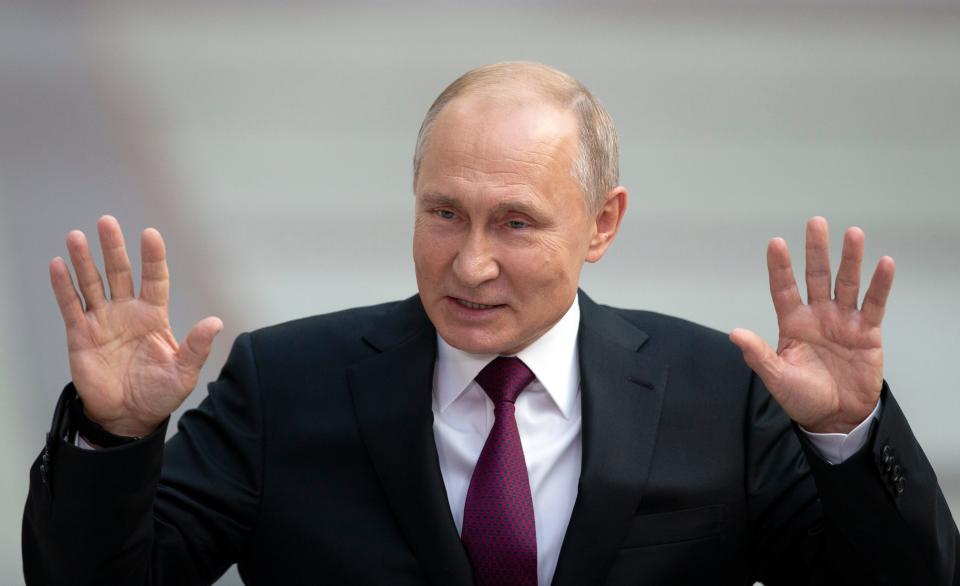At annual call-in show, Vladimir Putin talks Western sanctions, arrested reporter and $390B infrastructure bill

At his annual live call-in show Thursday, Russian President Vladimir Putin backed a big dose of socialism – a $390 billion spending program – to address an array of complaints by callers unhappy about low wages, pensions, bad roads and crowded hospitals.
More than 1.5 million people sent in their questions by phone, video calls or internet in the tightly choreographed "Direct Line With Vladimir Putin" show. It dealt with a wide range of topics, from wages to Western sanctions to the arrest of a Russian journalist. It was his 17th Q&A show since his first in 2001.
Seated in a theater-in-the-round-style setting, Putin fielded questions from a studio audience and used the opportunity to push his $390 billion National Projects plan, akin to a national infrastructure bill.
He acknowledged up front that Russian workers have gone through lean times in recent years.
"Indeed, the real incomes of citizens have declined over several years," he said. "The biggest decline was in 2016. Today, incomes are gradually recovering."
Russian productivity is among the lowest of the world’s major economies, according to the Organization for Economic Co-operation and Development. Living standards declined as Russia's economy stagnated, and incomes fell over the past five years.
Along with the weak economic news, data from the state-run VTsIOM pollster showed last month that public trust for Putin had dropped to its lowest level since 2006, falling to 31.7%, according to The Moscow Times. His overall approval rating, however, has remained steady at 65.8%.
Putin said his National Projects program should jump-start the economy.

"The ultimate goal of all these events (the National Projects) is to put the economy on a new track and make it high-tech, increase labor productivity and, on this basis, to improve the living standards of our citizens and ensure the security of our state for the long historical perspective," he said.
Putin said he expects quick results.
"The results must be felt now – this year, next year and so forth. They must be reflected in people’s incomes and wages," he said, according to the Moscow Times.
Putin batted back suggestions that government workers should be paid the same as ordinary workers.
“Imagine that a minister receives the same salary as an ordinary worker. I say this with a heavy heart. I would like ordinary workers' incomes to increase," he said. "If we sharply lower the salaries of officials, they will simply run away, we will lose qualified personnel, and this will eventually affect the population's living standards."
He blamed some of the country's economic ills on a drop in world energy prices – a huge factor for a country dependent on energy exports – and international sanctions. He said that since 2014, the sanctions cost $50 billion in "missed opportunities."
Western sanctions were imposed after the Russian annexation of Crimea and after a nerve agent attack last year on a former Russian double agent, Sergei Skripal, and his daughter in the United Kingdom.
Putin vowed never to "surrender to the West" and argued that even if Russia changed its policies dramatically, it would bring little change in Western sanctions.
"There may be symbolic gestures, but nothing will drastically change," he told the audience.
On other topics:
• Putin said he’s ready for a meeting with President Donald Trump but doesn’t expect a quick improvement of Russian-U.S. ties. He said the two sides particularly need to talk about arms control.
• The Russian president fielded a question on the arrest of a Russian investigative journalist, Ivan Golunov, on drug charges. The anti-corruption reporter, who said he was framed, was subsequently freed and all charges dropped. Putin fired two high-ranking police officers involved in the arrest.
“It is necessary to establish control over the activities of law enforcement agencies so that a situation like Golunov's does not happen again,” Putin said, according to the Russian Interfax news agency.
Contributing: The Associated Press
This article originally appeared on USA TODAY: At annual call-in show, Vladimir Putin talks Western sanctions, arrested reporter and $390B infrastructure bill
